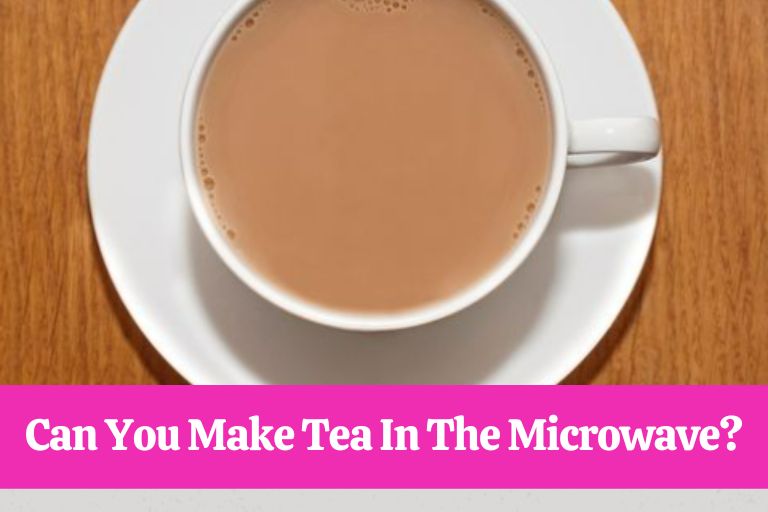Making tea in the microwave is a quick and convenient way to get your cuppa – but is it safe? Microwaves can often create hot spots within the beverage, leading to scalding accidents.
In this article, we’ll discuss the pros and cons of making tea in the microwave and look at alternative methods for brewing your favourite cup of tea.
Can You Make Tea in the Microwave?
Yes! You can make tea in the microwave. Add a few teaspoons of your favourite tea leaves to a mug, pour hot water over the top, cover it with a plate or dish, and heat it in the microwave for 1-2 minutes. Please stir it, let it sit for a minute, and enjoy your freshly brewed tea!
How to Make Tea in the Microwave?
Making tea in the microwave is a quick and easy way to enjoy a hot cup. Here’s what you need to do:
- Combine 1 cup of cold water and 1 tea bag in a mug or microwave-safe bowl.
- Place the mug or bowl into the microwave with the lid off.
- Set the timer for 3 minutes on high power and click start.
- When the time is up, remove your mug or bowl from the microwave and allow it to cool for 2 minutes before drinking.
- Enjoy!
Can I boil water in the microwave for tea?
Yes, you can boil water in the microwave for tea. However, you must be careful, as microwaves can create hot spots and uneven heating. This could lead to scalding accidents or even boiling over your cup. It is best to use short, controlled bursts of heat when using a microwave, and always stir the water before drinking it.
Can you microwave tea with milk?
Yes, you can microwave tea with milk, but it is not recommended. There are several reasons for this:
- Microwaving the milk can cause it to separate and become grainy.
- Microwaving the tea with milk can also change its flavour and texture, making it less desirable than if it were brewed with hot water.
- Microwave radiation can cause chemical changes in food, including tea, which may make the drink toxic.
Why shouldn’t you microwave tea?
It is not recommended to microwave tea because of the following reasons:
- Microwaving milk can cause it to separate and become grainy.
- Microwaving tea with milk can change its flavour and texture, making it less desirable than if it were brewed with hot water.
- Microwave radiation can cause chemical changes in food, including tea, which may make the drink toxic.
How long should you microwave tea?
It is not recommended to microwave tea. If you choose to microwave tea, the time may vary depending on the cup size and power of your microwave. However, it is generally best to heat the water and add the milk at the end to preserve flavour and texture.
How long do you boil tea in the microwave?
It is not recommended to boil tea in a microwave, as the flavour and texture of the tea can be adversely affected. If you choose to boil tea in a microwave, it is best to set the timer for no longer than one minute and stir after each interval.
Does microwaving tea change the taste?
Yes, microwaving tea can change the flavour and texture of the tea. The amount of time it is microwaved, as well as the power level of your microwave, will have an impact on the taste.
What is the best way to heat water for tea?
The best way to heat water for tea is in a kettle on the stove. This method ensures that the water reaches a consistent temperature and prevents it from becoming too hot, which can adversely affect the flavour of the tea.
An electric kettle with temperature settings may be used for precise temperature control. For those without access to a kettle or stove, a microwave can be used but should be done in short intervals and stirred between each one.
Why do Americans microwave their tea?
Americans often microwave tea because it is convenient and quick to heat water. The microwave also allows for better temperature control since some teas require higher temperatures than what can be reached with boiling water on the stove. Microwaving tea leaves less room for error, which makes it a popular choice among tea drinkers.
Conclusion
The best way to heat water for tea is on a stovetop or an electric kettle if precise temperature control is needed. We invite readers’ comments about their experiences making tea in the microwave – have you tried this method before? What tips do you have for others who want to try microwaving their favourite cup of tea?




